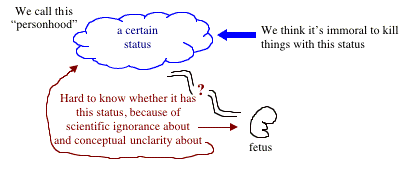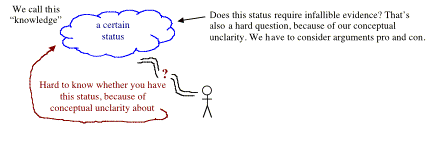
On p. 14 of the Rosenberg Dialogue, Justin claims that Gemma and Skip are just disagreeing about how to use the word "know." He suggests that there is a loose, everyday sense of "know" which Gemma is using, whereas Skip is appealing to a stricter, more philosophical sense of "know." In Gemma's sense, it is true that she knows things about the external world, even if, in Skip's sense, it is not.
Let's talk about this idea for a bit...
Is the debate with the skeptic really just a debate about how to use the word "knowledge"? Should we just say, look, there's a loose, everyday sense of "knowledge," and a stricter, more philosophical sense of "knowledge," and we do have knowledge in the everyday sense but not in the more philosophical sense. End of story, let's go home. (...and why should we care about having knowledge in the philosophical sense, anyway?)
I want you to realize, right at the beginning of this course, that the question:
Does the skeptic mean the same thing by "knowledge" as we ordinarily mean by it?
is a hard question. It requires careful investigation. It would be rash to conclude that we and the skeptic mean different things by "knowledge," just because we disagree about whether we have it. Suppose one doctor says you have cancer and another doctor says you don't. You wouldn't automatically conclude, "Oh I guess they mean different things by 'cancer'"--would you? Well, the same goes for "knowledge." Just because the skeptic and the ordinary person disagree about how much knowledge we have, it doesn't automatically follow that they mean different things by "knowledge." If we want to say they mean different things by "knowledge," that's a thesis we need to carefully argue for.
When people start doing philosophy, they find it natural to be very sloppy here in their thinking. They say:
Of course this is just a debate about how to talk. The skeptic uses the word "knowledge" in such a way that it requires an absolutely certain proof, and the ordinary person uses the word in such a way that it doesn't require that. But it's just a word. If we want to, we can call the state we're in right now with respect to the external world "knowledge." There's no deep issue here. It just turns on how we decide to use our words.
I called this sloppy thinking. Let me explain why.
Imagine that the Bush administration decides to impose an extra $10,000/year tax on students. Only they say, let's not call it a "tax." Let's call it a "grant." That sounds nicer. (They're "granting" you a bigger debt.) Hey, what are you complaining about? The government just gave you a big grant.
Or imagine that we're in a debate about whether abortion is moral or not, and we get to disagreeing about whether a fetus is really a person. I say, well, it's just a matter of how we use the word "person." So really the whole debate about abortion is arbitrary. If the government decides to call a fetus a "person," then it will be immoral to have abortions; if not, not.
That doesn't seem right. It seems like a better picture is this:

Now, we happen to call this status "personhood." And it is completely arbitrary that we use that word to name that status. We could easily use that word to refer to some other status, instead, if we like. But that wouldn't change the rest of the picture.
Similarly:

It doesn't seem to matter very much whether we call this a "tax" or a "grant." It would be just as bad either way.
Now it's true, it is a matter of arbitrary convention how we use the word "knowledge." We could use it to refer to penguins, if we wanted to. But as it happens, we use that word to pick out a certain kind of intellectual status a person can have. And that status is very interesting to us. (Well, I'm not saying everybody cares about it. But I assume it's interesting to you or you wouldn't be here. It was very interesting to Faust, too: so interesting that he was willing to sell his soul in order to get it.)

This status--the one we in fact use the word "knowledge" to talk about--is what we're concerned with, in this course. It is arbitrary what name we give to this status. We could call it "knowledge," or we could call it something else, or we could give it no name at all. The fact that it's arbitrary what name we give that status doesn't show that it's arbitrary whether someone has the status, in a given case. It will sometimes be controversial and hard to decide whether a given person has the status. That's why we have a whole branch of philosophy devoted to the subject. But that just shows that the questions we're investigating are hard. Like the question whether a fetus counts as a person: that question is also hard. You should not take it to show that the questions have no answer, or that it's totally arbitrary how we answer them, and that one answer is just as good as another.
I said that people sometimes say:
The skeptic uses the word "knowledge" in such a way that it requires an absolutely certain proof, and the ordinary person uses the word in such a way that it doesn't require that.
That might be true, or it might not. It's something we'll be investigating as we proceed.
Stroud pays a lot of attention to the question whether the skeptic means the same thing by "knowledge" as we ordinarily mean by it. (See pp. 35-6, and 40-42 of the Stroud reading in the coursepack.) Stroud talks about someone who distorts the meaning of "There are no physicians in New York," by setting the requirements for being a "physician" absurdly high. Maybe something similar is going on with the skeptic's claim that "We can't know anything about the external world." Maybe that claim only comes out true when you distort the meaning of "knowledge" into some special philosophical sense.
Stroud doesn't think that that's so. He'll argue that what the skeptic denies we have is just the same ordinary sort of knowledge, of the same ordinary sorts of facts, that we often claim and believe ourselves to have in everyday life. And he tries to show, in Chapter 2 of his discussion, that the skeptic's argument does not rest on distorting our ordinary standards or requirements for knowledge. We'll look at that discussion later. For now, we will continue to keep our eyes open. Maybe the skeptic is operating with the same notion of "knowledge" that we use in everyday discourse, maybe he isn't. We'll have to look into that.